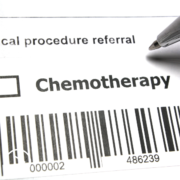A Look at Ongoing Acute Myeloid Leukemia Phase III Trials
A Look at Ongoing Acute Myeloid Leukemia Phase III Trials from Patient Empowerment Network on Vimeo.
What are the acute myeloid leukemia (AML) Phase III clinical trials that are ongoing? Dr. Naval Daver from the University of Texas MD Anderson Cancer Center shares his perspective about encouraging trials. Learn about the MORPHO Study and others.
[ACT]IVATION TIP from Dr. Daver: “The maintenance with gilteritinib and the MORPHO Study, as well as the relapsed refractory study as well as the use of a e-selectin inhibitor called uproleselan, and hopefully this will lead to approval of the next batch of three or four drugs, which will further improve outcomes for frontline as well as relapsed AML.”
Download Resource Guide en español
Related Resources:

|

|

|
Transcript:
Art:
Dr. Daver, can you speak to some of the ongoing Phase III trials in AML, what are you most excited about?
Dr. Naval Daver:
This time there are numerous ongoing phase three in acute myeloid leukemia, some in the frontline, some in the relapse setting. In the frontline setting, the ones that I’m most excited about are trials incorporating a novel immunotherapeutic pathway called the CD47 antibody that works to activation of macrophages, these are looking at a very high-risk molecular group of acute myeloid leukemia, the TP53 in adverse cytogenetics, and there are two randomized phase threes with this agent, one focused on TP53 mutated AML looking at the azacitidine and magrolimab versus the current standard of care FDA-approved azacitidine-venetoclax (Onureg or Vidaza-Venclexta) in TP53 mutated.
The other is actually looking at all older unfit AML so trying to improve on azacitidine venetoclax doublet with a triplet, so this is looking at azacitidine venetoclax magrolimab versus azacitidine-venetoclax placebo so if both of these trials are positive, then this will lead to incorporation of immunotherapy in the frontline setting in AML, which is exciting and something we’ve been working towards for the last 10, 15 years.
The other Phase III trials in the frontline setting or in the maintenance setting really that I’m excited about is called the MORPHO Study…this is using a FLT3 inhibitor gilteritinib (Xospata) as a maintenance post-transplant, so we know FLT3-mutated patients respond well, when they receive intensive induction FLT3 inhibitor, we still need to take them to transplant because even though the initial response is good, many can relapse.
So we actually try to give to the cycles of intensive induction for the move to transplant, and then if we start there, we still see at about 40 percent of these patients can relapse in the next three years, so this has led to efforts to add a maintenance FLT3 inhibitor gilteritinib single agent post-transplant as a maintenance for one to two years versus placebo observation, which has historically been a standard of care, and so this is being looked at a large multi-center called the MORPHO Study that we hope to get data from in the near future.
Another study in the similar design that’s being done by the UK cooperative group is looking at maintenance with the oral azacitidine, post-transplant for non-FLT3, so similarly, can we overall improved outcomes not just for FLT3, but the general patient population is going to transplant by using the maintenance oral azacitidine post-transplant versus placebo.
And in the relapse setting, there is a very novel unique oral therapy drug called uproleselan, which is an e-selectin inhibitor, and this agent is now being combined with traditional salvaged chemotherapy such as FLAG-Ida mec versus the placebo mec plus FLAG-Ida or mec in the relapse setting.
And that’s what he’s actually been completed to enrollment, and we’re hoping to hear data from that in the near future. So these are the major randomized studies focusing on TP53, FLT3, and relapsed refractory AML that we’re looking for in the near future and hopefully could lead to two or three more new approvals in the AML space.
My activation tip for this question is that there are ongoing numerous frontline Phase III as well as relapsed refractory Phase III, targeted immunotherapy approaches, specifically among these we’re excited about the CD47 antibodies. The maintenance with gilteritinib and the MORPHO Study, as well as the relapsed refractory study as well as the use of a e-selectin inhibitor called uproleselan, and hopefully this will lead to approval of the next batch of three or four drugs, which will further improve outcomes for frontline as well as relapsed AML.



